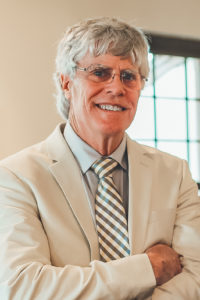John Dunn is a Sunshine State native who grew up exploring the natural areas of Miami and South Florida. He hailed from a family of farmers but charted his career path as a writer and teacher of history, law studies, sociology and philosophy.

He has written more than 400 articles for a variety of publications, such as Florida Trend, Europe, Overseas Life and Sierra and authored 16 nonfiction young adult books. In February 2020, Dunn’s nonfiction Drying Up: The Fresh Water Crisis in Florida earned the Florida Historical Society’s Stetson Kennedy Award for writing about our natural environment and in 2019 the Bronze Medal in the Florida Book Awards, Florida Nonfiction category.
On April 21st, he will be the guest speaker for the popular Institute for Human and Machine Cognition (IHMC) evening lecture series, with “an updated look at Florida’s water woes.”
“Sewage spills, pollution, runaway sprawl, urbanization, failing infrastructure, toxic algal blooms, sea level rise and unsustainable groundwater pumping still keep taking a toll,” he says. “If this keeps up, many scientists fear there won’t be enough water for humans and the natural world. With millions of new residents on the way, Florida’s environmental problems will escalate dramatically.”
But, he says, “All is not lost.”
Over the past couple of years, Dunn has given numerous presentations through in-person and virtual talks for book fairs and libraries, and for conservation and civic organizations around the state.
Of note to those who recall the history of Marti City as a once-thriving part of Ocala’s cigar industry, Dunn wrote Jose Marti: Cuba’s Greatest Hero. He is currently under contract to write the tentatively titled Justice at the Crossroads: The South’s Reckoning with Climate Change.
His IHMC lecture will focus on restoration efforts, including those using green infrastructure to mimic natural hydrology, the new economics of virtual water and the rethinking of water as a precious life source, not a commodity.
“Finally, I’ll offer tips on what audience members can do to protect our freshwater supplies,” he says.
The lecture takes place at IHMC’s Ocala campus at 15 SE Osceola Ave. and begins with a reception at 5:30p.m. Seating will be limited to accommodate social distancing. To learn more, go to www.ihmc.us/lectures






